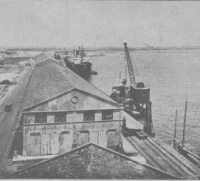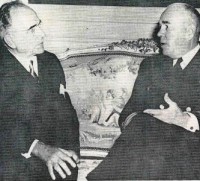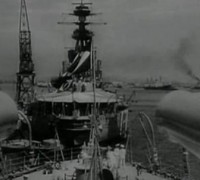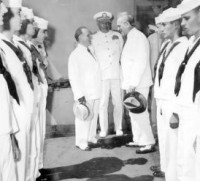- COMMANDER SOUTH ATLANTIC
8)A SUMMARY
The Admiral sent a report to the Chief of Naval Operations on November 20 1941. Its contents furnish a summary of the South Atlantic situation as it appeared at that time, so a condensation is in order at this point. Besides references to operations as previously given here, there were other matters important enough to emphasize.
One section of Squadron VP-52, consisting of seaplanes had arrived at Natal for duty. The Thrush, a small Auxiliary Seaplane Tender, which had already reported at Belem, was due at Natal on the 17th to serve VP-52.The Force had been ordered to supply a Destroyer to embark Army Officers for an inspection of Ascension Island, Latitude 08ºN, Longitude 34ºW, where a base was being projected. As the Force was already down to three Destroyers Leaders, the Omaha Task Group had been ordered to take these officers to Ascension, while carrying on regular ocean patrol en route.
Since the entry of the United States into the war, the situation at Vichy held Martinique had grown steadily worse. A Task Group headed by the Cincinnati had been ordered to the vicinity, and had proceeded there on December 11. On the night of the 13th the Cincinnati had lost a plane in the dark off Martinique. Since then alterations had been made in the patrol arrangements. The Memphis Group had relieved the Cincinnati Group and maintained vigilance until, on the afternoon of December 19, orders came to discontinue the Martinique operations and to proceed to San Juan.
The report contained a good deal about conditions in Brazil. Concerned the matters of the Marines, which had already arisen, the Admiral stated frankly that he did not think it advisable to send them as guards to Belem, Natal and Recife. The facilities for quartering in those places were bad and it was doubtful whether the local authorities would take kindly such an idea. As an alternative suggestion, the Admiral believed the Brazilians would cheerfully, and with great pride, assign their own troops to this same duty.
As had been previously noted, the Admiral’s suggestion came too late. The Marines had been sent before the U.S. authorities could be dissuaded from the idea. Though they were ultimately put to use, it did not alter the fact that sending them in the first place was a mistake.
Difficulties had at first arisen with the Brazilians regarding the basing of American planes at Natal, but these had already been smoothed over. The Admiral had preceded the arrival of VP-52 by making contact with the State Governor of Rio Grande do Norte, the Mayor of the City, the local Brazilian Army and Navy Commands, and the General in charge of the Area. He found them all ready to receive U.S. planes and willing to afford every help in accommodating them. Logistics could be provided at Natal and Recife, and Panair passenger line was certain to lend all assistance in its power.
The recently installed Commander of the planes at Natal had been directed by the Admiral to make a daily report to the Brazilian Regional Military Commander via the Naval Observer at Recife. Initiation of this policy had both pleased and impressed the Brazilian Military. Meanwhile, the seaplanes had organized, had become established, and had started patrols. Their principal deficiency was in torpedoes, which the Admiral urged to be sent to Natal with all dispatch, since he expected these to be his heaviest arm against any strong enemy opposition likely to be encountered.
It seemed possible, in those early days, that Recife would before long be the target of enemy air attacks. The danger would make it advisable to send ships of the Force to the better protected harbor of Bahia, whenever circumstances compelled them to spend the night in port. Recife lay so open to attack that a miniature of Pearl harbor there seemed a possibility, should the Germans ever be able to send over a surprise force of bombers.
At the beginning of 1942, the Vichy in control of French West Africa, the danger had to be reckoned with seriously. Needless to say it never materialized. Ships of Task Force Three had all performed well, but due to being so much at the sea, needed repairs. The Destroyers in particular required Navy Yard availability. Machinery overhaul was imperative for all the Groups.
Finally, as the Admiral could note with pleasure, personal contacts made in Brazil had already begun to pay dividends in the form of cooperation and support. A brief appendage to this report describing the Trinidad situation, spoke none too well of the immediate prospects there. The American Officers were insufficient in number.
While the large British staff was willing to give cooperation, this could be no adequate substitute. Physical construction of the American base did, however proceed satisfactorily. Everything in the situation clearly pointed to the need for setting up the Force to operate out of Brazilian ports, particularly Recife and Bahia.
HyperWar - Commander South Atlantic Force. U.S. Naval Administration in WW II



